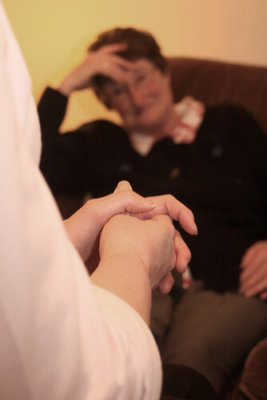What is Paranoid Personality Disorder?

By: David Goehring
A personality disorder is when your ingrained ways of thinking, feeling, and behaving are consistently different to others. And different in ways that make relationships and functioning in society difficult.
Paranoid personality disorder (PPD) involves a long-term pattern of being constantly suspicious and distrustful of others. It means you live life from the distorted perspective that everyone is malevolent and ‘out to get you’.
It is not about a feeling that you are constantly being watched or followed, or that others are persecuting you. These are more commonly symptoms of schizophrenia.
PPD is part of a group of personality disorders that the Diagnostic and Statistical Manual of Mental Disorders (DSM) call “Cluster A”. Cluster A disorders all involving “odd or eccentric” thinking.
How common is paranoid personality disorder?
With symptoms apparent by early adulthood, paranoid personality disorder is more common in men than women.
It’s estimated one in ten people in the UK suffer some sort of personality disorder. But exact UK figures of how many people suffer from paranoid personality disorder are not known, as many who suffer from personality disorders do not seek help.
Studies in the United States that have attempted to find numbers of PPD sufferers offer percentages of anywhere between 2.3% to 5.1% of the American population.
Symptoms of paranoid personality disorder
It’s important to recognise that the symptoms of a personality disorder tend to be things that most people experience at some point.
To truly be the signs of a personality disorder, the symptoms need to be ingrained and longstanding. They are symptoms that constantly and consistently make the individual’s life difficult.
Symptoms of paranoid personality disorder can involve:
- never trusting others, even friends and family
- constantly suspicious of others who it is assumed have an agenda to hurt, harm or deceive
-

By: Stephanie Sicore
overly sensitive to setbacks
- attribute negative meaning to what others say, interpreting things as hostile or belittling when others see it as harmless or even friendly
- paranoia that a partner or spouse is cheating despite no evidence
- often fighting for their rights, of which they have an inflated idea
- hyper vigilant – always on the lookout for danger
- hold grudges and slow to forgive
- secretive because they believe what they say will be used against them
- hard to get along with, often hostile and argumentative
- complain often
- aloof, come across as cold and unemotional
- potentially devious
- can be overly rational and objective
- tendency towards sarcasm
- excessive need to be independent and self-sufficient
- self-important and constantly refer to themselves
- possibly see the world through a lens of conspiracy theories.
What causes paranoid personality disorder?

By: Roland Tanglao
It’s still an unknown as to what exactly causes paranoid personality disorder. But it’s thought to be from a combination of factors.
As with many personality disorders, a genetic link is suspected. This is because cases of paranoid personality disorder seem more common in families which already exhibit psychotic disorders, especially schizophrenia and delusional disorder.
But this could also just support another theory – that PPD is a learned trait and is environmental. A child growing up in an environment that is full of paranoia might grow up to see the world through a lens of suspicion.
Or, paranoid personality disorder could be caused by trauma as a child. This would be an overwhelming experience, or series of experiences, that left the child with low self confidence. They’d be left with an ingrained core belief that other people are bad and always deceive you.
It’s important to keep in mind that personality disorders are not a medical sickness. You can’t look in a microscope and find physical anomalies that are consistent across all sufferers.
Personality disorders are rather just terms created by the medical community in an attempt to understand groups of people with similar symptoms. They are useful terms, but should not be used to diminish your individual experiences.
How is paranoid personality disorder diagnosed?
Paranoid personality disorder is diagnosed by a mental health care professional who will ask the individual a series of questions and take a detailed life history.
Like most personality disorders, PPD is usually only diagnosed in adults. Children and adolescents are still developing their personalities, and disorders are longstanding patterns of behaviour.
To be diagnosed with PPD, an individual will have to match a specific set of criteria put forth by the mental health guidelines followed in their country of residence. The most well-known mental health reference is the controversial DSM-V, created in America.
But the UK and most European countries favour the diagnostic guidebook put out by the World Health Organisation (WHO). This is called the ICD-10 Classification of Mental and Behavioural Disorders.
For a diagnosis of paranoid personality disorder using the ICD-10, first of all, the general criteria of a personality disorder must be met. Then, at least four of the following symptoms must be present (quoted directly from the ICD-10):
- Excessive sensitivity to setbacks and rebuffs.
- Tendency to bear grudges persistently, e.g. not forgiving insults, injuries or slights.
- Suspiciousness and a pervasive tendency to distort experience by misconstruing the neutral or friendly actions of others as hostile or contemptuous.
- A combative and tenacious sense of personal rights out of keeping with the actual situation.
- Recurrent suspicions, without justification, regarding sexual fidelity of spouse or sexual partner.
- Persistent self-referential attitude, associated particularly with excessive self-importance.
- Preoccupation with unsubstantiated “conspiratorial” explanations of events around the subject or in the world at large.
How is paranoid personality disorder treated?

By: Alan Cleaver
Treatment is of course difficult, as people with PPD rarely trust anyone. Let alone a doctor or therapist. So they are not very likely to seek help.
And yet talk therapy, if a bond of trust can be forged between the client and counsellor or psychotherapist? Is the most effective and the treatment of choice.
While PPD tends towards a lifelong condition, talk therapies can help to reduce paranoia. They introduce new perspectives and ways of looking at the world and others. It can also improve skills around interrelating and communicating, and boost low self-esteem.
(Go to our main site for information on what types of counselling help personality disorders).
Medication is sometimes offered for paranoid personality disorder, in conjunction with therapy. This is often anti-psychotics to reduce paranoia, and anti-anxiety medication to help with excessive worry.
But in many cases medication is not the best route of treatment long-term with PPD as it causes the sufferer to be paranoid and suspicious of the medication itself.
Group therapy and family therapy are not recommended for paranoid personality disorder as the sufferer is not likely to trust the others involved, and such a situation can increase their paranoia to harmful levels.
Related mental health issues to paranoid personality disorder
As with all mental health disorders, individuals with PPD have a high risk of experiencing other mental health challenges. The most common of these is anxiety, phobias, major depressive disorder, and addictive behaviours including alcoholism and drug use.
A 2007 study on comorbidity and personality disorders found a 14.1 rate of sufferers also having post-traumatic shock disorder (PTSD). It’s a statistic which certainly feeds the theory that many personality disorders are the result of childhood trauma.
People with symptoms of paranoid personality disorder might also have symptoms of schizophrenia or delusional disorder. In this case these diagnoses would be the ones given, not PPD. In fact it’s thought that some cases of these other disorders develop from PPD.
What might it be like to spend time with someone with paranoid personality disorder?
It can admittedly be rather challenging and demand strength of spirit if your friend or loved one has paranoid personality disorder. They will treat you with suspicion constantly, accusing you of thinking a certain way that you actually don’t. This can make you feel like you always have to prove yourself as trustworthy, or can lead you to constantly feel questioned and upset.
They will likely often pick fights with you, need to be in control of everything you do together, and will accuse you of overstepping their rights even if the rights they speak of are illogical.
Their paranoia might also lead them to be quite hard on you, criticising what you do and say and making you feel like you can’t win. He or she might potentially be quite mean to you, put you down using sarcasm, or even be quite vengeful should you ever do anything that doesn’t entirely suit them, all of which can be hard to deal with.
They might also often just withdraw, suddenly not returning your messages, leaving you feeling very confused.
Don’t expect displays of emotion from individuals with paranoid personality disorder. They are rare to show affection, or even be in relationships at all, and tend to be emotionally cold and aloof.
If you are dealing with someone with a personality disorder, you might need support yourself. While you can not force someone else into therapy (nor is it useful to them if they don’t really want to be there) you can give yourself an outlet for your confusion and help to find new ways to manage.
Famous people with paranoid personality disorders
Famous people historically suspected (but not proven) to have paranoid personality disorder have included Richard Nixon, Hitler, Josef Stalin, and, more recently, Saddam Hussein.
Do you have a question about paranoid personality disorder that wasn’t answered above? Ask below.




